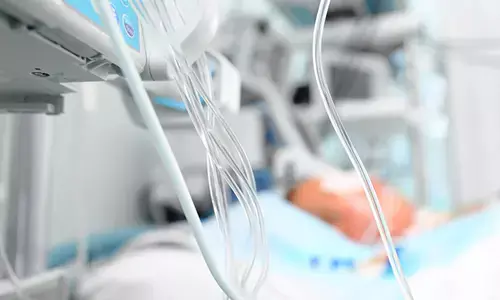- Home
- Medical news & Guidelines
- Anesthesiology
- Cardiology and CTVS
- Critical Care
- Dentistry
- Dermatology
- Diabetes and Endocrinology
- ENT
- Gastroenterology
- Medicine
- Nephrology
- Neurology
- Obstretics-Gynaecology
- Oncology
- Ophthalmology
- Orthopaedics
- Pediatrics-Neonatology
- Psychiatry
- Pulmonology
- Radiology
- Surgery
- Urology
- Laboratory Medicine
- Diet
- Nursing
- Paramedical
- Physiotherapy
- Health news
- Fact Check
- Bone Health Fact Check
- Brain Health Fact Check
- Cancer Related Fact Check
- Child Care Fact Check
- Dental and oral health fact check
- Diabetes and metabolic health fact check
- Diet and Nutrition Fact Check
- Eye and ENT Care Fact Check
- Fitness fact check
- Gut health fact check
- Heart health fact check
- Kidney health fact check
- Medical education fact check
- Men's health fact check
- Respiratory fact check
- Skin and hair care fact check
- Vaccine and Immunization fact check
- Women's health fact check
- AYUSH
- State News
- Andaman and Nicobar Islands
- Andhra Pradesh
- Arunachal Pradesh
- Assam
- Bihar
- Chandigarh
- Chattisgarh
- Dadra and Nagar Haveli
- Daman and Diu
- Delhi
- Goa
- Gujarat
- Haryana
- Himachal Pradesh
- Jammu & Kashmir
- Jharkhand
- Karnataka
- Kerala
- Ladakh
- Lakshadweep
- Madhya Pradesh
- Maharashtra
- Manipur
- Meghalaya
- Mizoram
- Nagaland
- Odisha
- Puducherry
- Punjab
- Rajasthan
- Sikkim
- Tamil Nadu
- Telangana
- Tripura
- Uttar Pradesh
- Uttrakhand
- West Bengal
- Medical Education
- Industry
Haloperidol fails to improve survival outcomes among ICU Patients with delirium: NEJM

A new article published in The New England Journal of Medicine shows that haloperidol therapy did not result in a substantially higher percentage of days alive and out of the hospital at 90 days compared to placebo among intensive care unit (ICU) patients with delirium.
Although there is no proof of its effectiveness, haloperidol is often used to treat delirium in patients in critical care units. Therefore, Nina Andersen-Ranberg and colleagues undertook this study to evaluate the effectiveness of haloperidol, particularly in the critical care unit.
Adult patients with delirium who had been admitted to the intensive care unit (ICU) for an acute condition were randomized to receive intravenous haloperidol (2.5 mg three times a day plus 2.5 mg as needed up to a total maximum daily dose of 20 mg) or placebo in this multicenter, blinded, placebo-controlled trial. In the ICU, haloperidol or a placebo was given for the duration of the delirium and as often as necessary for recurrences. The number of days out of the hospital and surviving 90 days following randomization was the main outcome.
The key findings of this study were:
1. Randomization was performed on a total of 1000 patients, with 510 being placed in the haloperidol group and 490 being placed in the placebo group.
2. 987 (98.7%) of these individuals were included in the final analysis (501 in the haloperidol group and 486 in the placebo group).
3. 963 patients (97.6%) had accessible primary outcome data. With an adjusted mean difference of 2.9 days (95% CI, 1.2 to 7.0) (P=0.22), the mean number of days alive and out of the hospital at 90 days was 35.8 (95% confidence interval [CI], 32.9 to 38.6) in the haloperidol group and 32.9 (95% CI, 29.9 to 35.8) in the placebo group.
4. At 90 days, mortality in the haloperidol group was 36.3%, compared to 43.3% in the placebo group (adjusted absolute difference: 6.9 percentage points [95% CI: 13.0 to 0.6]).
5. 11 participants in the haloperidol group and 9 patients in the placebo group experienced serious adverse effects.
Reference:
Andersen-Ranberg, N. C., Poulsen, L. M., Perner, A., Wetterslev, J., Estrup, S., Hästbacka, J., Morgan, M., Citerio, G., Caballero, J., Lange, T., Kjær, M.-B. N., Ebdrup, B. H., Engstrøm, J., Andreasen, A. S., Bestle, M. H., … Mathiesen, O. (2022). Haloperidol for the Treatment of Delirium in ICU Patients. In New England Journal of Medicine. Massachusetts Medical Society. https://doi.org/10.1056/nejmoa2211868
Neuroscience Masters graduate
Jacinthlyn Sylvia, a Neuroscience Master's graduate from Chennai has worked extensively in deciphering the neurobiology of cognition and motor control in aging. She also has spread-out exposure to Neurosurgery from her Bachelor’s. She is currently involved in active Neuro-Oncology research. She is an upcoming neuroscientist with a fiery passion for writing. Her news cover at Medical Dialogues feature recent discoveries and updates from the healthcare and biomedical research fields. She can be reached at editorial@medicaldialogues.in
Dr Kamal Kant Kohli-MBBS, DTCD- a chest specialist with more than 30 years of practice and a flair for writing clinical articles, Dr Kamal Kant Kohli joined Medical Dialogues as a Chief Editor of Medical News. Besides writing articles, as an editor, he proofreads and verifies all the medical content published on Medical Dialogues including those coming from journals, studies,medical conferences,guidelines etc. Email: drkohli@medicaldialogues.in. Contact no. 011-43720751


